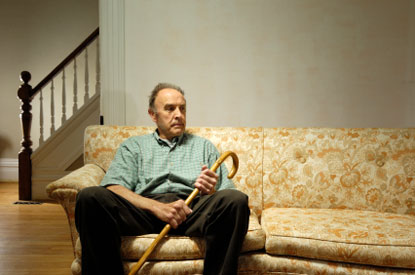By Nick Mann | 23 November 2011
The treatment of many older people being cared for at home is breaching their human rights, the Equality & Human Rights Commission said today.
In Close to home: older people and human rights in home care, the equality watchdog said its home care inquiry had found older people suffering physical abuse and neglect, with carers showing a ‘chronic disregard’ for older people’s privacy and dignity when carrying out intimate tasks.
It said ‘significant shortcomings’ in the way councils commission home care services were contributing to the problem, with some local authorities focusing more on cost than the quality of care.
And it highlighted a ‘legal loophole’ that removed the protection of the Human Rights Act from hundreds of thousands of people receiving council-funded home care. The Act’s clauses preventing inhuman or degrading treatment do not extend to external providers, which are increasingly providing home care on behalf of councils.
The report calls for the law to be changed to ensure all home care is brought under the Human Rights Act, as happened with council-funded care homes in 2008.
It also advocates more effective monitoring, with the Care Quality Commission inspectorate working with councils and the government to build human rights into home care services and to deal with abuses faster and more effectively.
‘Clear and robust’ guidance for both councils and older people on human rights would also help, the report says.
Commissioner Sally Greengross says: 'It is essential that care services respect people's basic human rights. This is not about burdensome red tape; it is about protecting people from the kind of dehumanising treatment we have uncovered.
‘The emphasis is on saving pennies rather than providing a service which will meet the very real needs of our grandparents, our parents, and eventually all of us.’
Care services minister Paul Burstow said the programme of home care inspections announced by the CQC earlier this week showed that the government was taking action to address the problems raised in the report.
‘The EHRC's report exposes the good, bad and ugly sides of care in people's own homes. This government won't tolerate poor care. I am determined to root out ageism and bad practice to drive up quality and dignity in care,’ he said.
‘The CQC will be conducting an additional programme of inspections of home care providers looking at the care and dignity of older people and how staff are trained and supported. We have also asked Skills for Care to draw up training standards and develop a code of conduct for care workers.’
David Rogers, chair of the Local Government Association's community wellbeing board, said the results of the EHRC inquiry were ‘symptomatic’ of a social care system that was ‘underfunded and in need of urgent reform’.
He added: ‘Councils are facing long-term triple pressures of insufficient funding, growing demand and escalating costs. Despite their best efforts, they are having to make tough decisions about the care services they can provide.’
Explaining there was no ‘one-size-fits-all’ approach to service provision, he added: ‘Reforming adult social care is one of the most important issues this country is facing and governments can’t keep dodging the question of how to properly fund it. The longer ministers procrastinate, the more our population ages and the worse things will become.’



The treatment of many older people being cared for at home is breaching their human rights, the Equality & Human Rights Commission said today.

In Close to home: older people and human rights in home care, the equality watchdog said its home care inquiry had found older people suffering physical abuse and neglect, with carers showing a ‘chronic disregard’ for older people’s privacy and dignity when carrying out intimate tasks.
It said ‘significant shortcomings’ in the way councils commission home care services were contributing to the problem, with some local authorities focusing more on cost than the quality of care.
And it highlighted a ‘legal loophole’ that removed the protection of the Human Rights Act from hundreds of thousands of people receiving council-funded home care. The Act’s clauses preventing inhuman or degrading treatment do not extend to external providers, which are increasingly providing home care on behalf of councils.
The report calls for the law to be changed to ensure all home care is brought under the Human Rights Act, as happened with council-funded care homes in 2008.
It also advocates more effective monitoring, with the Care Quality Commission inspectorate working with councils and the government to build human rights into home care services and to deal with abuses faster and more effectively.
‘Clear and robust’ guidance for both councils and older people on human rights would also help, the report says.
Commissioner Sally Greengross says: 'It is essential that care services respect people's basic human rights. This is not about burdensome red tape; it is about protecting people from the kind of dehumanising treatment we have uncovered.
‘The emphasis is on saving pennies rather than providing a service which will meet the very real needs of our grandparents, our parents, and eventually all of us.’
Care services minister Paul Burstow said the programme of home care inspections announced by the CQC earlier this week showed that the government was taking action to address the problems raised in the report.
‘The EHRC's report exposes the good, bad and ugly sides of care in people's own homes. This government won't tolerate poor care. I am determined to root out ageism and bad practice to drive up quality and dignity in care,’ he said.
‘The CQC will be conducting an additional programme of inspections of home care providers looking at the care and dignity of older people and how staff are trained and supported. We have also asked Skills for Care to draw up training standards and develop a code of conduct for care workers.’
David Rogers, chair of the Local Government Association's community wellbeing board, said the results of the EHRC inquiry were ‘symptomatic’ of a social care system that was ‘underfunded and in need of urgent reform’.
He added: ‘Councils are facing long-term triple pressures of insufficient funding, growing demand and escalating costs. Despite their best efforts, they are having to make tough decisions about the care services they can provide.’
Explaining there was no ‘one-size-fits-all’ approach to service provision, he added: ‘Reforming adult social care is one of the most important issues this country is facing and governments can’t keep dodging the question of how to properly fund it. The longer ministers procrastinate, the more our population ages and the worse things will become.’



















